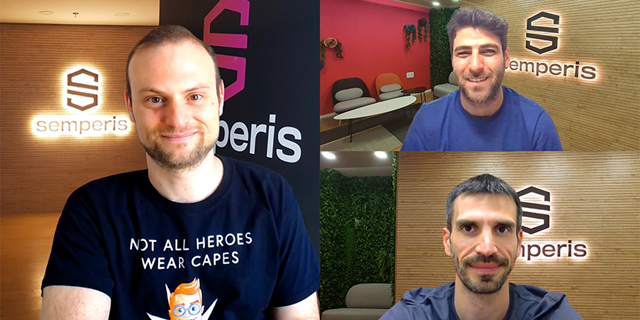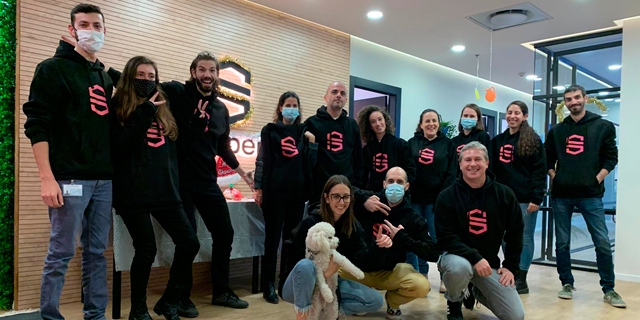

IL Tech in NY
Israel and New York have more similarities than differences, say Semperis execs
Semperis joined CTech for its IL Tech in NY series in collaboration with Israeli Mapped in NY to share how Israel and New York cultures are actually rather similar
“There are actually many more similarities regarding the work cultures of New York and Israel,” revealed the executives from cybersecurity firm Semperis. “For example, both are known for having a very strong work ethic. However, in New York City, or in the U.S. in general, it is much more common to work from home, and perhaps there’s an expectation of more flexibility.”
While everyone today is working from home due to Covid-19, it seems that the similarities between Israel and New York go beyond remote working environments. Semperis joined CTech to discuss work ethic, culture, and even Broadway. Company name: Semperis Field of activity/product: Cybersecurity Founders:- Mickey Bresman, CEO (New York-based)
- Guy Teverovsky, CTO (Tel Aviv-based)
- Matan Liberman, EVP Business Development (Tel Aviv-based)
- Insight Partners
- World Trade Ventures
- Silvertech Ventures
Related Stories
In a nutshell, Semperis partners with government agencies and Global 2000 enterprises to empower comprehensive protection for their directory services on-premises and in the cloud. We've delivered first-of-its-kind solutions to address the entire lifecycle of a directory attack – from finding and fixing security vulnerabilities, to intercepting privilege escalation and persistence, and quickly responding to ransomware and other data integrity emergencies. On the disaster recovery side, we’ve introduced the only backup and recovery solution purpose-built to recover AD from cyber disasters like ransomware and wiper attacks. Fully automating the AD forest recovery process, our solution virtually eliminates the risk of malware re-infection during restoration, prevents human errors, and reduces downtime to minutes instead of days or even weeks.
Why New York? What advantages does it offer? How does the market differ from Israel? How does the competition differ? New York has the biggest hub of enterprises in the U.S., maybe even in the world. It’s an ideal location if you want your customers to have easy access to your team and engage in meaningful conversation. Getting customer input often is critical for a high growth business like Semperis, and this is a lot easier when you can meet face-to-face, in person. Being a train stop away creates the perfect environment to be close to customers, partners, and investors and have an open line of communication with them. Thinking globally, New York is a domestic and international hub, so it’s easy to get where you want to go at all times, making it very simple to reach customers all over the map. New York has so much to offer, the opportunities are limitless. Two things you learned about the U.S. market from operating in New York: There are unique working cultures across pretty much every region of the U.S. People in different cities and states have their own way of doing things. We’ve found that different U.S. customers, and certain industry sectors, do not share the same pain points across the board. It’s important to familiarize yourself and accommodate various working styles and business challenges in order to build trust and strong communication with your customers. From a cultural perspective, New York, for example, is an extremely fast-paced environment as opposed to other areas of the country that might operate at a different speed. These details, no matter how minor, need to be taken into account when working with customers. Two things you learned about American investors as a result of starting operations there: Semperis already had U.S. investors before moving our headquarters officially to New York but being in New York City provided us with much more exposure. As everyone knows, investors don’t just invest in technology, but also the leadership team. It all comes down to people at the end of the day. Being in New York City, we were able to meet face-to-face with prospective investors and this allowed us to grow our network more organically and accelerate relationships. The investors became even more team-oriented and provided enormous value-add through mentoring and networking. Two suggestions for Israeli entrepreneurs on what to do in New York: Simply get involved in the community, network, and feel the rhythm of New York City. Outside of business, take advantage of all the unique cultural opportunities such as Broadway, restaurants, music, and the night-life scene. New York City has so much to offer! Two suggestions for Israeli entrepreneurs on what not to do in New York: Funny enough, I’d warn you not to expect public transportation to be very intuitive. Make sure you know where you’re going before getting on the train. It could be smart to even study the subway systems before relying on them for transportation. Also, there’s something very unique to New York City I learned when I first moved here: be sure to avoid pausing or walking slowly in the middle of the sidewalk. You’ll disrupt the entire fast-paced, walking flow of the city! On a scale of 1-10 how much did the Covid-19 pandemic impact your work? Please expand in your own words the positive and negative effects the outbreak had on your company. When Covid-19 started, we were really focused on making sure our employees were safe and healthy, first and foremost. Adapting to the new reality, working from home was a very new situation for me since we did a lot of our business in-person. Don’t get me wrong, we’re fortunate that Semperis is a tech company and as a whole, the company has been able to adjust extremely well. We’ve been able to continue to grow the team, innovate, and expand our product offerings. Cybersecurity is one of those areas that is a necessity for organizations during both the good times and the tough times. We’re mission-driven to help organizations, especially on the front lines to be as cyber resilient as possible. What are the differences when it comes to recruiting employees (advantages and disadvantages)? We as a company have a remote work culture and from day one Semperis has focused on hiring people based on talent, instead of geographic location. Pre-pandemic, that process included the employee often coming in to meet face-to-face at our New York City office or at one of our satellite offices across the U.S. Now, our onboarding has changed slightly to meet the needs of a remote environment, but the location of talent we hire has always been very diverse. What are some of the workplace culture differences between Israel and New York? There are actually many more similarities regarding the work cultures of New York and Israel. For example, both are known for having a very strong work ethic. However, in New York City – or in the U.S. in general - it is much more common to work from home, and perhaps there’s an expectation of more flexibility. The IL Tech in NY project is a collaboration between CTech and Israeli Mapped in NY. For more information: Franklin@IsraeliMappedinNY.com